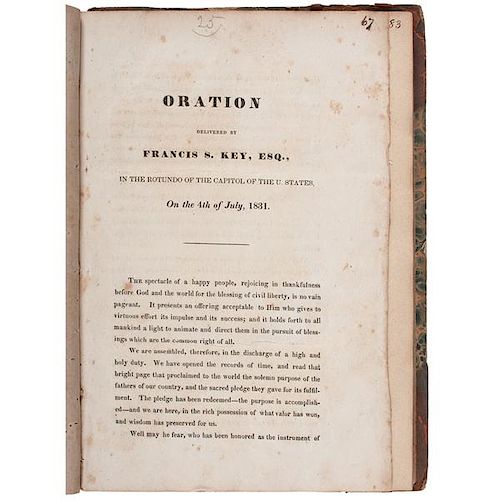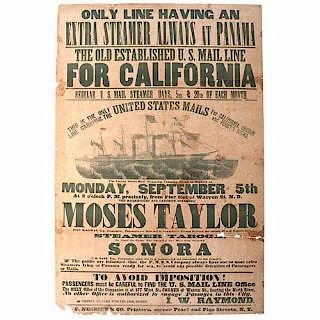Francis Scott Key, Oration Delivered on July 4, 1831
About Seller
6270 Este Ave.
Cincinnati , OH 45232
United States
With offices in Cincinnati, Cleveland and Denver, Cowan’s holds over 40 auctions each year, with annual sales exceeding $16M. We reach buyers around the globe, and take pride in our reputation for integrity, customer service and great results. A full-service house, Cowan’s Auctions specializes in Am...Read more
Two ways to bid:
- Leave a max absentee bid and the platform will bid on your behalf up to your maximum bid during the live auction.
- Bid live during the auction and your bids will be submitted real-time to the auctioneer.
Bid Increments
| Price | Bid Increment |
|---|---|
| $0 | $25 |
| $500 | $50 |
| $1,000 | $100 |
| $2,000 | $250 |
| $5,000 | $500 |
| $10,000 | $1,000 |
| $20,000 | $2,500 |
| $50,000 | $5,000 |
| $100,000 | $10,000 |
About Auction
Jun 10, 2016 - Jun 11, 2016
Cowan's Auctions dawnie@cowans.com
- Lot Description
Francis Scott Key, Oration Delivered on July 4, 1831
8vo ledger, 3/4 leather over marbled paper boards. First 38 pages have clippings from newspapers mounted on them, most are speeches given in the late 1820s and early 1830s. After p. 42 (as numbered by the assembler of the volume - a bit unconventionally), there are inserted several speeches printed as monographs. Pages 67 - 82 feature an "Oration Delivered by Francis S. Key, Esq., in the Rotundo of the Capitol of the U. States, On the 4th of July, 1831." Pp. 83 - 106 are blank (same paper as the pages with the clippings), followed by nine additional printed speeches (8, 7, 16, 15, 11, 24, 16, 7, 32 pages). Newspapers start in 1828; last speech is 1838. Housed in a brown cloth clamshell box with red spine label. Spine of the box is leather over wood.
Francis Scott Key (1779 - 1843) was born in Maryland, just north of the District of Columbia. His father was a lawyer and Key read law under his uncle, Philip Barton Key after graduation from St. Johns College in Annapolis. He went aboard the British ship HMS Tonnant in Sept. 1814 in an attempt to negotiate a prisoner exchange. Once Key saw the position and strength of British forces, they could not let him leave. He was thus on the ship when the British bombarded Fort McHenry in the Battle of Baltimore. When the American flag was seen through the haze still flying the following morning, Key was inspired to pen the words to "Defence of Fort M'Henry." The poem was published barely a week later in the American and Commercial Daily Advertiser (21 Sept. 1814). Shortly after, music from an English gentleman's club was adapted to it, "To Anacreon in Heaven." This, of course, would be known more popularly as "The Star-Spangled Banner." The Navy used it as their official song beginning in 1889, and it was widely used unofficially elsewhere for many decades. It did not become the United States' national anthem until March 3, 1931.
As a writer and amateur poet, Key was in some demand as a speaker. Fourth of July orations were popular throughout the 19th century, and many were published. Key must have been honored to deliver this one in the Capitol.Spine has completely disintegrated. Text block is in several sections. Clamshell box has separated hinge. Spine of clamshell box has a section of wood split off along with the leather. Also light wear along edges of box.Condition
- Shipping Info
-
SHIPPING. At the request of the buyer, Cowan's will authorize the shipment of purchased items. Shipments usually occur within two weeks after payment has been received. Shipment is generally made via UPS Ground service. Unless buyer gives special instructions, the shipping method shall be at the sole discretion of Cowan's Auctions, Inc.. Cowan's is in no way responsible for the acts or omissions of independent handlers, packers or shippers of purchased items or for any loss, damage or delay from the packing or shipping of any property.
-
- Buyer's Premium



 EUR
EUR CAD
CAD AUD
AUD GBP
GBP MXN
MXN HKD
HKD CNY
CNY MYR
MYR SEK
SEK SGD
SGD CHF
CHF THB
THB














